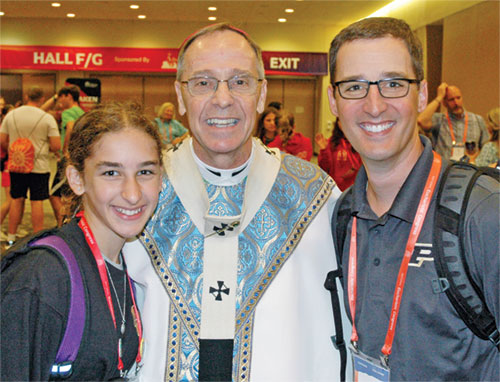A surprising story of friendship shapes the heart of Archbishop Thompson’s message to youths

After celebrating a Mass on the morning of July 20 for youths at the National Eucharistic Congress in Indianapolis, Archbishop Charles C. Thompson greeted, blessed and smiled for photos with people for more than 30 minutes in a hallway of the Indiana Convention Center, taking his time with each group and person. Here, he poses for a photo with Maria Otte and her dad, Karl Otte, members of
St. Simon the Apostle Parish in Indianapolis. (Photo by John Shaughnessy)
By John Shaughnessy
The touching story of friendship wasn’t originally part of the homily that Archbishop Charles C. Thompson planned to share with the young people at the National Eucharistic Congress in Indianapolis, but he ultimately felt compelled to tell it.
He shared the story as he celebrated Mass for the youths on the morning of July 20 in a packed hall at the Indiana Convention Center.
“It’s a story about two young guys,” the archbishop noted, recalling a story he read years ago about two boys he called Peter and Paul.
“Peter was in junior high school. He was walking home one day carrying an armful of books, and a couple of bullies started beating him up, knocking his books out of his hands,” the archbishop began. “Paul saw Peter trying to get his books together while the bullies ran off. Paul helped Peter gather his books, took some of them and asked him where he lived. Paul said, ‘I don’t live far from there.’ And so they walked together.
“The next day, Peter came out, carrying an armful of books again, and there was Paul waiting for him again, ready to help him carry his books home so he didn’t get picked on. And a third day and a fourth day. And eventually Peter stopped bringing all his books home. And over time, Peter and Paul became best friends. Paul was a very popular guy so that really helped Peter.”
Fast forward to their time together in high school where Peter blossomed, becoming a great athlete, prom king and the valedictorian of their class while Paul’s popularity faded in comparison.
“On the day of graduation, as Peter stood up to give his valedictorian speech, he decided to share with everyone about his friendship with Paul,” Archbishop Thompson continued. “He recounted how they met and how that friendship developed. And he confessed something that day that he had never even told Paul.
“He said, ‘That day I was carrying my books home because my life at home was far from perfect. I was lonely, I was depressed, I was despairing. I had nobody in my life. I was carrying my books home because I was going to end it all. When Paul stopped and helped me carry my books, I just couldn’t do it that first night. The next day when I got picked on at school again, I thought I’d take my books home and do it this time. And there was Paul waiting.’ ”
The archbishop noted, “Peter said he couldn’t do it that night—and the next day and the next day until he stopped carrying his books home. He started having hope.”
The archbishop paused briefly before he added, “He was telling Paul that day for the first time how he had saved his life.”
As silence filled the hall, Archbishop Thompson continued, “We don’t know the wounds that people carry. We see someone on the outside and the deepest wounds often are in the inside.
“We don’t know the lives we touch, but every time we pick up a book, help someone carry a book, offer a smile, sit with a sick friend, say hello to a stranger—we never know the difference we’re making. We never know how God is using us. The smallest of gestures can make the greatest difference.”
Archbishop Thompson then transitioned his homily to the tremendous difference that the Blessed Mother made and continues to make, starting with her willing “yes” to be the mother of Jesus.
The archbishop told the youths to embrace Mary as a role model.
“Our National Eucharistic Revival and Congress provide a unique opportunity of drawing ever closer to Jesus through Mary, predicated upon our openness to saying yes and being willing to remain with the Lord, like the Blessed Virgin Mary,” the archbishop said.
Stressing a need for people of all ages to seek an encounter with Christ, Archbishop Thompson added, “An encounter with Christ is unlike any other, for it involves an encounter with God. Such an encounter is therefore transforming—and should be every time we gather at Mass and adoration, and every time we encounter him in each other.”
The archbishop said that these transforming encounters lead us to understanding the importance of the Eucharist in our lives as “the real presence of Jesus, as made available to us through his passion, his death and his resurrection.”
Concluding his homily, the archbishop encouraged
the youths to “go forth with a single focus of being Christ-centered.”
“It makes all the difference in our lives, our souls, our Church and our world,” he told them. “With the Blessed Virgin Mary, mother of the Church, we look to him as the way, the truth and the life—our hope and our salvation.”
Near the end of the Mass, Archbishop Thompson shared a compliment and a challenge with the youths.
“You’re the young Church now, and we need your energy. We need your gifts now. Whether you realize it or not, you give incredible witness to one another and to me and my brothers. And I’m so grateful.” †
(See all of our coverage of the National Eucharistic Congress at www.archindy.org/congress.)
